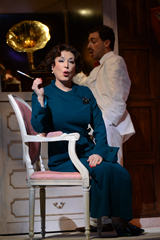| Opera Reviews | 13 May 2024 |
Was she top, or the bottom?by Steve Cohen |
|
| Adès: Powder Her Face Opera Philadelphia June 2013 |
|
|
On the other hand, if you disapprove of sexual conduct on stage, then stay away. Powder Her Face is the story of Margaret Campbell, the Duchess of Argyll whose husband's divorce suit in 1963 produced photographs of the duchess engaging in sex with many partners. He said her lovers included two government ministers and three royals. It's all disclosed in the opera libretto, including an on-stage simulation of fellatio. The opera has provoked sharply different responses from critics. Some say that it can't make up its mind whether it's a comedy or a tragedy; it lacks empathy, and the tragic aspects are not earned. On the opposite side, a Philadelphia critic wrote that it is the "greatest piece of work this season, and perhaps in several seasons." The truth lies in between. Margaret was the daughter of the millionaire chairman of Celanese Corporation. She lost her virginity at age 15 to the actor David Niven, was presented at Court in London in 1930 and then married the American golfer Charles Sweeny and embarked on a glamorous and elegant lifestyle. In 1951 she became the third wife of Ian Douglas Campbell, the Duke of Argyll, who was himself sexually promiscuous. "I had wealth, I had good looks," Margaret wrote about herself. "I was mentioned by Cole Porter in the words of his hit song, 'You're the Top.'" Actually, Porter did not list her in his catalog of superlatives in that song; it was P. G. Wodehouse who added these words to a British production of Porter's Anything Goes: "You're Mussolini/ You're Mrs. Sweeny." Margaret's fib provides a key to Margaret's personality. As shown in this opera, Margaret was a nasty person - deceitful, arrogant, anti-black, anti-Jewish and anti-gay. Which isn't to say she's not interesting, especially when she encounters disgrace and poverty later in life. The judge at Margaret's trial called her a female Don Juan, but that's too kind. Don Juan had much more charm. Philip Hensher's inventive libretto opens with the aging Margaret living in a hotel, then flashes back to her youth and her affairs. Act II is more emotionally involving as it portrays Margaret's divorce trial and then her years of fading looks and fading wealth. Near the end, a hotel manager serves an eviction notice for non-payment. He implies that the end of her life is at hand, and the projection of a skull underlines the point: No matter how desirable you once may have been, it will end. Adès's music includes snatches of tangos and of waltzes, which set the tone and the period. He attempted a Cole Porter-type song that fails to match the sauciness of the original. Adès also wrote a paean to wealth that's sung by a maid with high-coloratura sparkle, but it pales beside "Glitter and Be Gay," Leonard Bernstein's aria on that subject from Candide. Those near-misses aside, the Act I music is clever and comical. In Act II, Adès's score becomes richer, especially in a pair of anguished arias for Margaret as she comments on her fate. "No one ever loved me unless they were paid for it," she sings in a moment of loneliness. Corrado Rovaris skillfully conducted the 17-piece chamber orchestra, whose many percussion instruments provided arresting effects, like the sound of fishing reels slowly turning. As the duchess, soprano Patricia Schuman was haughty but elegant and sang the difficult score with full-bodied sound. Ashley Emerson was endearing as the maid, a society reporter and other soubrette characters. Christopher Tiesi appealingly sang a collection of tenor roles - electrician, lounge lizard, waiter and delivery boy. Bass Ben Wager was an impressive hotel manager, duke and judge. William Kerley directed with discretion, especially in contrast to a New York City Opera staging last year that placed 25 naked men (not in the libretto) in the duchess's bedroom. And that above-mentioned fellatio scene here revealed no more than the man's bare butt. Hensher's libretto itself is unnecessarily restrained. At Margaret's trial the judge sings that she "loved men she didn't even know," a polite way of saying she had sex with men she didn't even know. If Hensher's libretto had to mince words in 1995, surely they could be made more direct now. This production's essential restraint was to the good. The sexual deeds did not need underlining; the pathos was the outstanding feature of the opera. |
|
| Text ©
Steve Cohen Photo © Opera Company of Philadelphia |

 If
you were reluctant to attend Powder Her Face because you don't
like noisy, unmelodic scores, relax. This score by Thomas Adès contains
intriguing music with short melodies that intertwine and provide emotionally
gratifying climaxes. Powder Her Face, written near the start
of his career in 1995, supplies more melodic pleasure than his more
recent The Tempest, seen last year at the Met and on cinema screens.
If
you were reluctant to attend Powder Her Face because you don't
like noisy, unmelodic scores, relax. This score by Thomas Adès contains
intriguing music with short melodies that intertwine and provide emotionally
gratifying climaxes. Powder Her Face, written near the start
of his career in 1995, supplies more melodic pleasure than his more
recent The Tempest, seen last year at the Met and on cinema screens.





